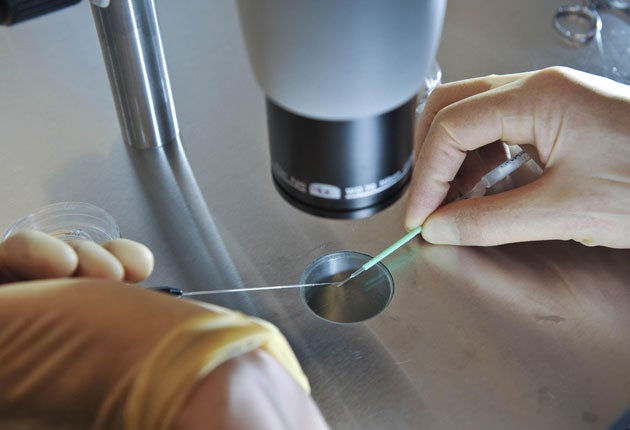IVF drugs may be linked to genetic defects discovered in embryos

Drugs used to stimulate the ovaries of older women undergoing IVF treatment may be causing genetic defects in the embryo which have until now gone undetected, a study has found.
Scientists have discovered abnormalities in the chromosomes of eggs from women over 35 years of age who had been treated with synthetic hormones to stimulate their ovaries prior to IVF.
The researchers said they were surprised to find the chromosome defects which appeared to have occurred during the second stage of the specialised process of cell division that leads to the creation of the human egg cell.
Chromosome defects in eggs were previously considered to have resulted in the first stage of cell division, which occurs when a woman was herself a foetus in the womb. Finding them during the second stage, which occurs at ovulation, therefore suggests they may have resulted from the hyperstimulation of the ovaries during IVF treatment.
The defects included abnormal variations from the usual number of 23 pairs of chromosomes. Three copies of chromosome 21 instead of the normal two, for instance, leads to babies with Down's syndrome. As women get older it becomes increasingly difficult for them to produce enough viable eggs for IVF treatment. It is common practice for older women to have their ovaries stimulated with stronger doses of drugs than is the case for younger women.
The results of the study are to be presented at a fertility conference in Stockholm this week but the scientists behind the research said that they wanted to reassure older women considering IVF treatment. They said further work needs to be done fully to explain the findings and there is no evidence to suggest that IVF babies of older women are at any higher risk of birth defects than babies conceived naturally by women of the same age.
"We found that some IVF eggs have up to seven chromosome abnormalities. This suggests the possibility that ovarian stimulation during the treatment may have caused some of these defects," said Professor Alan Handyside, director of the London Bridge Fertility, Gynaecology and Genetics Centre, who led the study.
"These defects are unexpected and it may be that this is just an undiscovered aspect of biology. At the moment all we can say is that this is part of the natural process as women get older."
The study, which will be presented at the European Society of Human Reproduction and Embryology, analysed more than 100 egg cells from 34 couples undergoing IVF treatment. The average maternal age was 40.
Scientists screened the chromosomes of the eggs and structures known as "polar bodies" that result from a type of cell division known as meiosis. Meiosis is a specialised form of division that results in eggs with half the normal complement of chromosomes – crucial to ensuring that the fertilised egg has the full complement of 46 chromosomes when it fuses with a sperm cell.
The first stage of meiosis occurs when the woman's ovary is developing in the foetus before birth, when the dividing chromosomes are held together by a kind of cellular "glue" ready for the second stage of division at ovulation.
However, when the ovary of an older women is stimulated with synthetic hormones it is possible that this dislodges the glue prematurely. This might result in abnormal numbers of chromosomes to segregate into the resulting egg cell.
"Our evidence demonstrates that, following IVF, there are multiple chromosome errors in meiotic divisions, suggesting more premature separation of single chromosomes resulting in more random segregation," Professor Hanyside said.
Stuart Lavery, a consultant gynaecologist at Hammersmith Hospital in London, said "This provides evidence that there is a problem, but it does not prove that it's treatment related," Mr Lavery said.
What does the research mean?
The most important conclusion to be reached from this research isn't so much the "why" but that the screening process for eggs to be used in IVF must be improved.
It is possible to screen the chromosomes of so-called First Polar Body eggs, at least as part of research. This paper stresses the importance of also screening Second Polar Body eggs, those that have been fertilised.
Doing so will, we can now see, allow us to better identify eggs that have developed abnormalities that result in conditions like Down's Syndrome.
The issue of whether drugs used to stimulate ovulation are having a role is two-fold. Are the drugs damaging the eggs or simply releasing those that would otherwise be discarded naturally because of abnormalities? Or it could be the drugs have no role at all? We don't know.
One intriguing point is that if the drugs are a factor we would have anticipated having seen more cases of Down's Syndrome among older mothers. They may be there but we haven't detected any such increased risk yet – it means we need to research the possibility.
Stuart Lavery, consultant gynaecologist at Hammersmith Hospital
Join our commenting forum
Join thought-provoking conversations, follow other Independent readers and see their replies
Comments
Bookmark popover
Removed from bookmarks